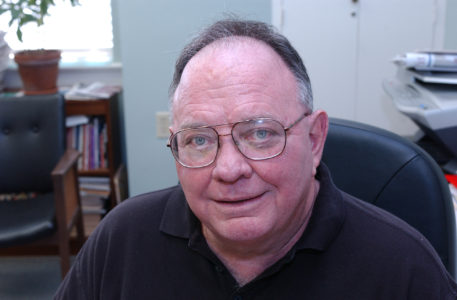Complete circle
By George Evans

George Evans
I have struggled recently, like most of you, with the situation of clerical sex abuse and cover up in the church I love. Most thought that the zero tolerance policy adopted by the American Catholic Bishops in Dallas in 2002 had dealt effectively with the sexual abuse problem related to the Boston scandal.
Things seemed to have settled down. We were as a Church back to worship, school, good works and paying the bills.
Then came the 2018 bombshell from Washington with extraordinary facts concerning the former Archbishop of Washington, Cardinal Theodore McCarrick and his alleged abuses reaching seminarians and even young priests. The rumored cover up of this activity reached all the way to Rome and possibly the Pope. Cardinal McCarrick has been disciplined to a private life of prayer and repentance. The Pope has demurred from any further comment about Cardinal McCarrick. Shortly after the McCarrick episode Pennsylvania exploded with a report from its Attorney General, based on an 18 month investigation of clerical sex abuse in seven Pennsylvania dioceses.
The report found more than 1,000 child victims of 300 priests over seven decades and alleges Catholic officials constructed a
“playbook for concealing the truth.” Pope Francis responded with a letter to the world’s 1.2 billion Catholics saying the church has “abandoned” its children and no effort must be spared to prevent further abuses and cover-ups.
This is the greatest scandal to hit the Catholic Church in a long, long time. The U.S. Conference of Catholic Bishops is scrambling to meaningfully respond. Significant numbers of Catholics have left the church of their birth or choice. Many others have had their trust in their leaders (bishops and priests) seriously damaged. I may be wrong, but I don’t believe the disaffection is as serious in the Diocese of Jackson as it may be elsewhere. Only time will tell.
What do we do to respond to the crisis? I think all of us – bishops, priests and laity – need to be honest about what has apparently gone on. Facts need to be acknowledged. If disclosure has not been made, now is the time to do so. Civil authorities need to be notified, if they have not been to date. If there are victims, aid must be provided to them in the form of psychological treatment and counseling assistance and even financial assistance if the situation demands it. It is my understanding the Diocese of Jackson has done these things. After all, the injury is enormous if there has been sexual abuse of a child. Jesus frequently tells us how special children are. Sexual abuse to children is not only sinful but may be criminal. Perpetrators should be held accountable be they clerical or lay. Gospel values apply to all.
If clericalism is part of the problem, as many assert, then laity should be included in whatever action is taken to resolve the problem. There are many catholic laity deeply passionate about their church with all sorts of expertise in medicine, business, law, counseling, administration, etc. who could be called on to help. It would appear to me that church leadership, being clerical could and should use the help. If clerical power is the problem or part of the problem, lay involvement should assist in the solution.
God loves our church. He knows we are hurt, embarrassed and disgusted, and rightly so. The old hymn tells us: Where Christ is, His Church is There. He will help us heal our church. We are the People of God. We must be honest, transparent, open and inclusive. If we are ready to listen to God’s voice and hear where he leads us in prayer and humility we can do what is necessary to bring our church to where it needs to be, the Body of Christ loving the Father and serving His people in need. Now is the time to join together, not to run away. Now is the time to reform the Church in action to again be the shining light on the mountain top for all to see and trust.
(George Evans is a retired pastoral minister at Jackson St. Richard Parish.)
